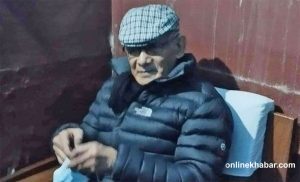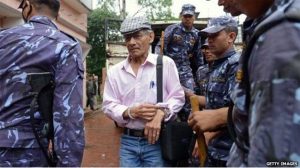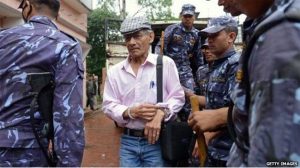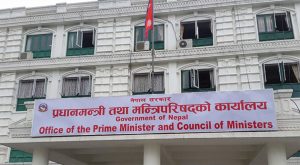
Charles Sobhraj is one of those criminals who, whether inside or outside the prison, has always been the centre of international discussion.
Just nine months ago, he came into controversy when he gave a sensational interview to the British tabloids Mirror and Daily Mail from the Central Jail saying that he would be released in three to four weeks.
Mirror’s correspondent Dan Warburton told Onlinekhabar that he had an opportunity to talk to Sobhraj on the phone through a relative.
“I came to Kathmandu for something else and wanted to meet him, but the prison authorities didn’t allow it,” Warburton said. “I later talked to him on the phone.”
That phone call and the article that followed caused an uproar in Nepal.
After Sobhraj’s interview, the Department of Prison Managment even formed an inquiry committee. The committee said that since Sobhraj was also guilty of the murder of Yunus Ansari, a fake note dealer, he would not be released immediately.
Despite that, Sobhraj continued to tell people who came to see him that he would be out soon. A month ago, even when the security officers of the prison reached Golghar of the Central Jail, he repeated the same claim, ‘I am leaving soon.’
To many, these were just wishful thinking. Even his lawyer Shakuntala Biswas and his second wife Nihita Biswas, the lawyer’s daughter, had given up hope that Sobhraj would get out anytime soon.
But on Wednesday, the Supreme Court of Nepal ordered the prison managment to release serial killer Charles Sobhraj who had spent 19 years in jail.
So what did make his unexpected early release possible? And, what would this forever newsmaker, whom the world refers to as the bikini killer also, do after getting out of prison?
Unexpected order

When the news of the order first broke out, the officials at Central Jail could not believe it. Time and again, they had seen the court give verdicts against Sobhraj. But, this time, it was different and many officials were shocked.
“We were all shocked,” an official at Central Jail told Onlinekhabar. “But the news was correct and he was getting out for real.”
According to his lawyer Sakuntala, this followed years of effort.
“We got to this order after four different orders,” she says.
Rule 29 (2 a) of the Prison Regulations, 1963, provides that prisoners who have reached the age of 65 years can ask for their prison sentence to be reduced by up to 75 per cent.
Sobhraj is 78 now. Four years ago, his team filed a writ of habeas corpus claiming that Sobhraj should be released. But, he was not released as this rule was only applicable to Nepali citizens.
However, on February 24, 2019, the court questioned the government why Sobhraj, who was undergoing heart treatment, should not be considered to be released as he had already served 75 per cent of this sentence.
Although the verdict was not as per Sobhraj’s demand, at that time, the Supreme Court issued an order in the name of the Ministry of Home Affairs to take the necessary decision within three months, stating that it is desirable to take a humane and prudent decision regarding him.
The background of the release

The writ of habeas corpus was filed yet again. By this time, he had already served 19 years (95 per cent) of his sentence.
During its hearing on Wednesday, the bench of justices Sapna Malla Pradhan and Til Prasad Shrestha noted that the government had disregarded the court’s order. The court also released him based on a letter sent to the court by the Central Jail on June 21.
In the letter, it was said that although Sobhraj’s health condition was normal, he was taking five types of medicine. It was also mentioned in the letter that his behaviour in prison was great. His name was even on the prison’s list of good inmates whose term should be cut down.
The Appellate Court, Patan, on May 9, 2016, even ordered to keep Sobhraj in a suitable place inside the jail instead of keeping him in Golghar. Goalghar is also known as the prison within a prison, where people who are a security threat or who can affect other prisoners are kept. But, that decision was not upheld. The Central Jail said that it could not transfer Sobhraj elsewhere as the Central Jail was overcrowded.
While ordering the release of Sobhraj on Wednesday, the bench relied on the grounds of non-compliance with one court order after another, and his deteriorating health conditions.
“It appears that the treatment against the minimum standard of treatment of prisoners is contrary to the Mandela Rules,”, the brief order of the court says, “Repeated orders have been issued by the high and supreme courts to provide facilities within the specified time as per Rule 29 (2 a) of the Prison Rules, 1963, but these have not been followed.”
The court said that when the Ministry of Home Affairs did not make a timely decision on the facilities that 78-year-old Sobhraj, who had already served 19 years of imprisonment, would have had an impact on his right to life and his right against solitary confinement.
“Continuously keeping him in prison is not compatible with the human rights standards of prisoners, the rights provided by the constitution and the law,” the court’s order says. “This order has also been issued to release him from prison today if he does not need to be detained in other cases and to arrange the necessary arrangements for him to return to his country within 15 days of this order.”
What next?

Dolendra Niraula, the jailer of Central Jail, says the process to release Sobhraj has begun and he would be released on Thursday.
Niraula says that since he is a foreign citizen, he will be handed over to the Department of Immigration. After that, according to the decision of the department, the process of deporting him will proceed, the officials say.
According to the director of the department, Pradarsani Kumari, his visa will be extended after he is brought to the department from prison.
“We will ask the court for evidence from the time he was arrested to today and start the process to deport him,” says Kumari.
Sobhraj, however, has expressed his desire to stay in Nepal for some time. According to a source close to him, he will file an application on Thursday, appealing to stay in Nepal.
Relatives from France, some foreign journalists and writers have also been invited to Kathmandu. A source tells Onlinekhabar that he offered to arrange for his relatives to stay at the Hyatt Regency, Kathmandu.
“Those who wrote books about Sobhraj are also coming, they have expressed their desire to meet them in Kathmandu,” a source close to him says.
He also plans to go to Gangalal Hospital in Bansbari and undergo a health check-up. On June 17, 2017, Sobhraj underwent heart surgery there. A team led by Dr Raamesh Koirala changed his mitral valve.
According to Koirala, Sobhraj last visited the hospital three months ago.
“It was a normal check-up. His health was fine,” said Koirala.
But, Kumari from the Department of Immigration says Sobharaj will not be allowed to stay in Nepal for a long time.
The court has ordered to send him back to his country within 15 days.
“We can leave him at a relative’s place until the documents are made and the process is completed. Otherwise, the immigration can keep him under surveillance,” she tells Onlinekhabar.
This story was translated from the original Nepali version and edited for clarity and length.
























